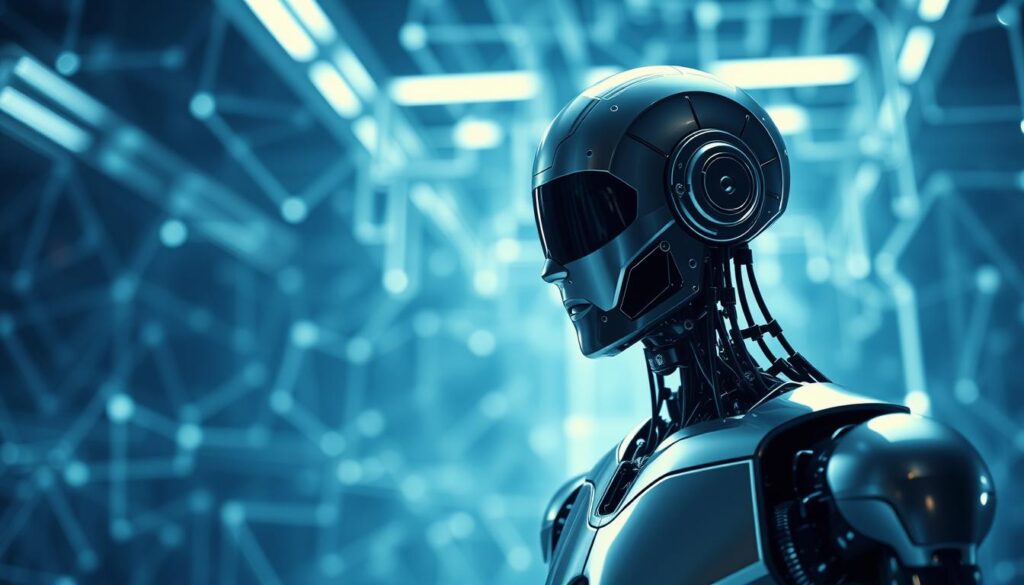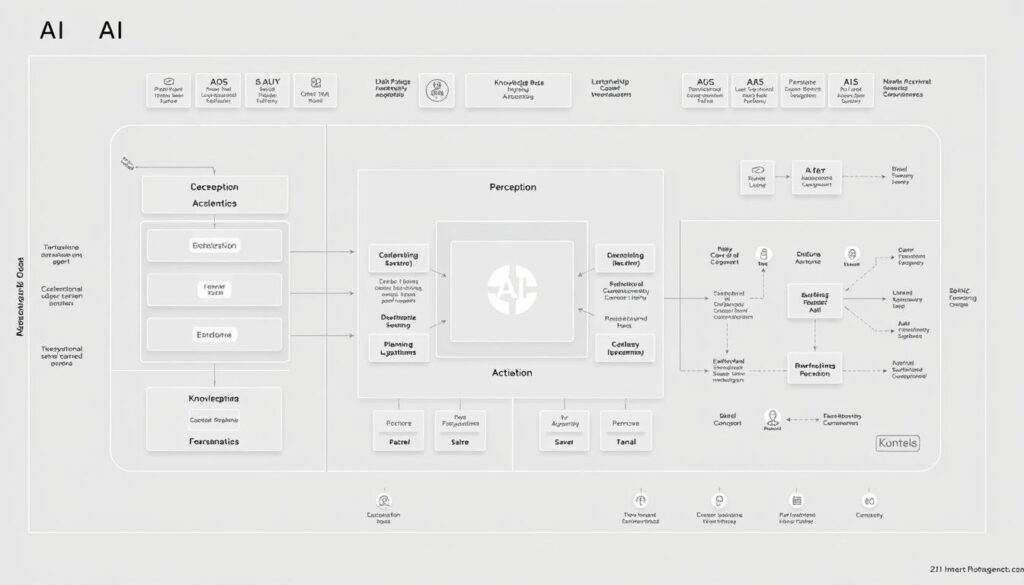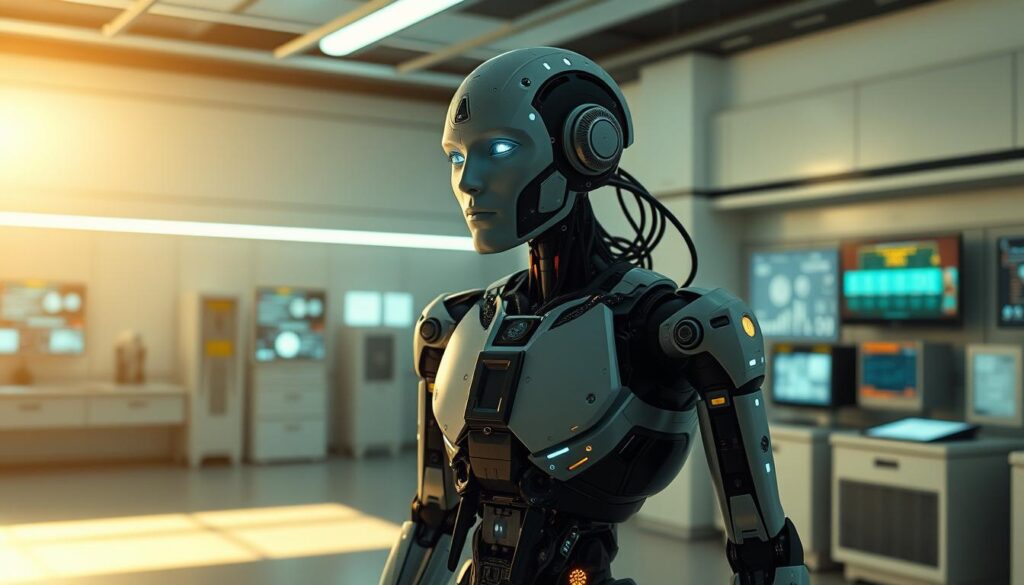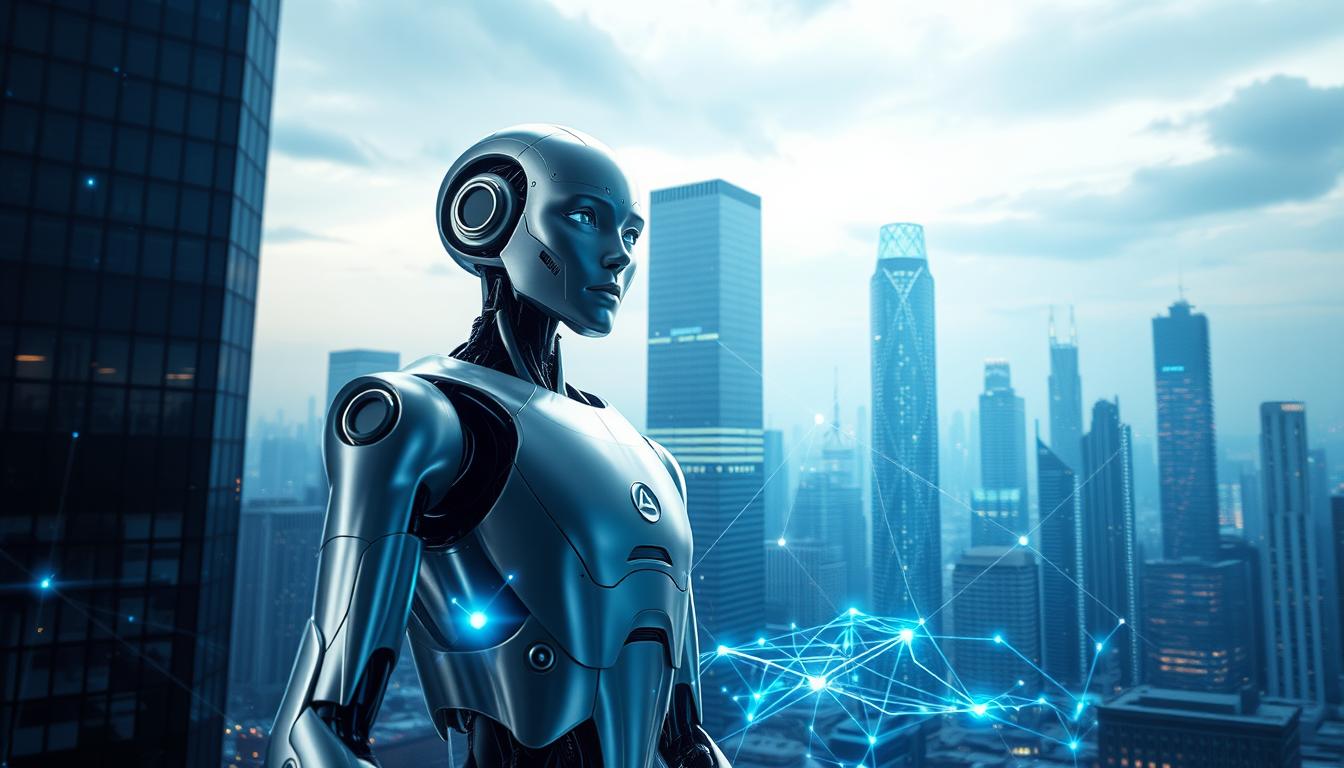Artificial intelligence agents are changing how we solve complex problems. They are more than just automated systems. They can see, think, and act with great intelligence.
These advanced AI agents are tackling tough challenges in many fields. Andrew Ng says AI agents will lead to big tech advancements in 2023. This will be a major step forward in how computers work.
Today’s AI agents are very independent. They can follow simple instructions, solve complex issues, and get better on their own.
Key Takeaways
- AI agents operate autonomously with minimal human intervention
- Advanced agents can utilize multiple tools and collaborate effectively
- Self-improvement capabilities enable continuous performance enhancement
- AI agents can handle complex tasks across diverse industries
- These systems represent a significant leap in artificial intelligence technology
Understanding AI Agents: Core Concepts and Fundamentals
AI agents are changing how we interact with the world. They have grown from simple tools to advanced systems that make decisions and act on their own.
Today, AI agents work at many levels, from simple to complex. They range from basic processors to complex systems that work together.
- Level 1 (Simple Processor): Basic text processing with minimal environmental interaction
- Level 2 (Router/Decision Maker): Enables basic program flow control through conditional logic
- Level 3 (Tool Caller): Selects and utilizes tools based on intelligent decision-making
- Level 4 (Multi-step Agent): Manages complex tasks by maintaining contextual state
- Level 5 (Multi-Agent Systems): Collaborative systems handling distributed, intricate tasks
Types of Intelligent Agents
AI agents come in different types, each with its own way of working:
- Reflex Agents: Reactive systems responding directly to environmental stimuli
- Model-Based Agents: Systems maintaining internal state representations
- Goal-Based Agents: Designed to achieve specific objectives through strategic planning
- Utility-Based Agents: Optimize decision-making using sophisticated evaluation metrics
- Learning Agents: Continuously improve performance through experiential knowledge
Key Components of Modern Virtual Assistants
Good AI agents have key parts that help them interact well:
- Perception Module: Processes and interprets environmental input
- Decision-Making Engine: Analyzes data and generates appropriate responses
- Action Executor: Implements selected actions with precision
- Learning Module: Adapts and refines performance through continuous feedback
The Evolution of AI Agent Technology

The journey of AI agent technology is a thrilling story of innovation. It started with simple rule-based systems. Now, chatbots are advanced machine learning assistants that can handle complex tasks and solve problems.
Key milestones in this evolution include:
- 1950: Alan Turing introduces the Turing Test to assess machine intelligence
- 1956: The Dartmouth Conference marks the official birth of artificial intelligence
- 1966: ELIZA becomes the first chatbot, using basic pattern matching
- 1970s-1980s: Expert systems dominate the AI landscape
In the 1990s, AI agents became smarter, able to process information on their own. Technological advancements accelerated rapidly. This led to big wins like IBM Watson’s victory on Jeopardy! in 2006 and AlphaGo’s win against Lee Sedol in 2016.
Today, machine learning assistants are more advanced. They use deep learning, natural language processing, and adaptive algorithms. This lets them understand context, learn from interactions, and give smarter responses.
The latest AI models, like GPT-3 and ChatGPT, have changed how we see AI agents. They can create human-like text, solve complex problems, and adapt to different situations.
- 2020: OpenAI releases GPT-3, showcasing advanced conversational abilities
- 2022: ChatGPT introduces revolutionary language interaction
- 2023-2030: Projected market growth from $5.1 billion to $47.1 billion
Looking ahead, AI agent technology will keep breaking new ground. It promises a future where intelligent systems work well with humans in many areas.
How AI Agents Transform Business Operations
The digital world is changing fast with AI agents leading the way. These smart virtual assistants are now key tools for businesses. They are changing how companies work in many fields.

AI agents are changing business plans in big ways. They make work more efficient and help make better decisions. They improve customer service and make complex tasks easier.
Automation and Strategic Decision Making
Modern AI agents are great at automating important tasks. They can:
- Analyze big data fast
- Give insights for planning
- Make routine tasks easier
- Lower mistakes in important work
Real-time Data Processing
Companies use AI agents to handle lots of data quickly. DHL’s AI solutions predict delays and suggest new routes. This cuts down on lost time.
Customer Service Enhancement
Virtual assistants like Bank of America’s Erica are changing how we talk to customers. They handle over 1.5 billion chats, showing they can offer personal and quick service.
As we look to the future, using AI agents is becoming essential. Companies that use these tools are getting ahead in the digital world.
AI Agent Architecture and Implementation

Creating an intelligent agent is more than just coding. It’s about building a system that can make decisions on its own and solve complex problems. This requires a deep understanding of how to design and implement such a system.
When building an AI agent, several key things must be considered:
- Scalable infrastructure design
- Robust data processing capabilities
- Advanced machine learning integration
- Secure communication protocols
Companies working with AI agents need to pay close attention to a few important areas. Interoperability is especially crucial. It can lead to a 35% boost in workflow efficiency, as seen in businesses that use AI well.
The steps to implement an AI agent are strategic:
- Assessing enterprise-specific requirements
- Selecting appropriate AI agent architecture
- Developing customized training models
- Integrating with existing technological ecosystems
By 2025, 70% of businesses plan to use intelligent agent technologies. This shows how important advanced AI architectures are becoming. Customizable AI systems can make solutions 50% more relevant across various industries. This makes them a key investment for forward-thinking companies.
By focusing on flexible, adaptable AI agent architectures, companies can achieve great efficiency and stay ahead in a digital world.
Advanced Features and Capabilities of AI Agents
Modern AI agents are changing how we interact with technology. They use advanced tech to perform better in many areas. This makes them smarter and more useful.

The world of AI is growing fast. Machine learning assistants are getting smarter. They now work and talk with us in new ways.
Natural Language Processing Breakthroughs
Natural language processing has changed chatbots and AI agents. They can now:
- Understand context better
- Communicate more clearly
- Translate languages in real time
- Get the meaning of words and sentences
Machine Learning Integration
Machine learning assistants use new algorithms to get better. Microsoft’s multi-agent library, from 2022, helps make systems smarter and more flexible.
- Learn and adapt
- Make predictions
- Get better at tasks
Adaptive Learning Systems
AI agents are getting better on their own. OpenAI’s o1 series model is a big step forward. It lets agents handle complex tasks better.
The future of AI agents looks bright. They will keep getting smarter and more helpful. This will open up new possibilities in automated help.
Practical Applications and Use Cases
AI agents have changed many industries, making complex tasks easier for businesses and people. They are smart systems that change our daily lives.
Let’s look at some cool ways AI agents are used in different areas:
- Customer Service: AI agents help with customer support, working 24/7 and fast
- Financial Trading: AI agents make quick investment choices with complex algorithms
- Healthcare: Advanced virtual assistants aid in diagnosis and patient care
- E-commerce: They offer personalized product suggestions and smart shopping experiences
A KPMG survey shows AI agent use is growing. 12% of companies are using them, and 37% are testing them. Microsoft says 100,000 organizations use Copilot Studio, showing how fast this tech is spreading.
In certain fields, AI agents are making big differences. For example, EY’s risk assessment used to take 50 hours but now takes minutes with AI. AI is also changing energy management, finance, and content suggestions.
The future looks bright. Accenture believes AI agents will soon be the main users of most business systems by 2030. This marks a big change in how we work and use digital tools.
Conclusion
The world of artificial intelligence agents is changing how businesses solve problems. These AI agents can handle huge amounts of data, automate tasks, and improve decision-making. They are now real tools that help us innovate and work better.
AI agents do more than just computer tasks. They can work on their own, learn from their surroundings, and solve problems fast. They change how we use technology and plan for the future.
Want to use AI agents for your business? Crowley Media Group offers top AI, SEO, PPC, and automation services. Their team can guide you through AI and find solutions that fit your needs. Call them at (916) 572-9755 or visit crowleymediagroup.com to begin your AI journey.
The future is now, and AI agents are leading the way. They bring us more efficient, smart, and adaptable technology. This technology can change how we work, think, and solve big challenges.








